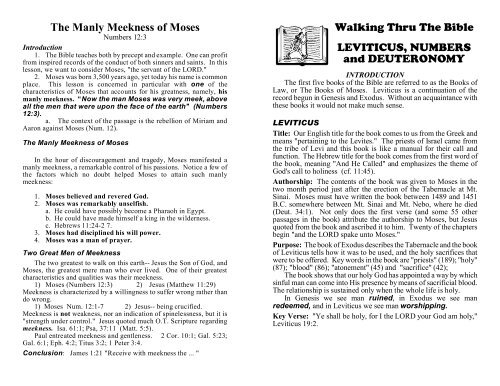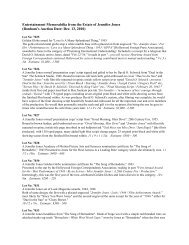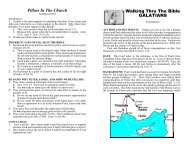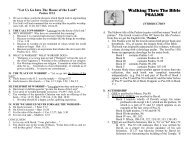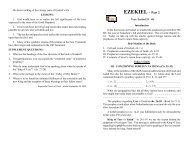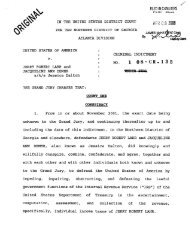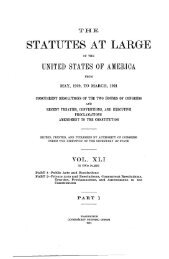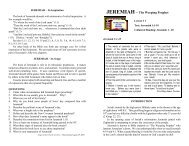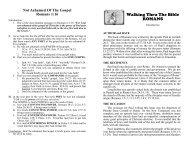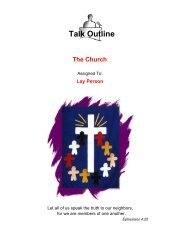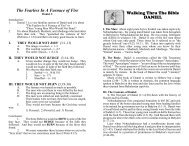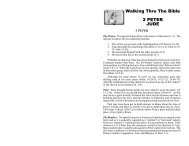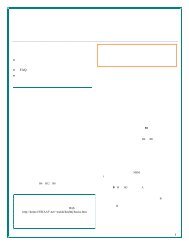The Manly Meekness of Moses Walking Thru The Bible LEVITICUS ...
The Manly Meekness of Moses Walking Thru The Bible LEVITICUS ...
The Manly Meekness of Moses Walking Thru The Bible LEVITICUS ...
Create successful ePaper yourself
Turn your PDF publications into a flip-book with our unique Google optimized e-Paper software.
<strong>The</strong> <strong>Manly</strong> <strong>Meekness</strong> <strong>of</strong> <strong>Moses</strong><br />
Numbers 12:3<br />
Introduction<br />
1. <strong>The</strong> <strong>Bible</strong> teaches both by precept and example. One can pr<strong>of</strong>it<br />
from inspired records <strong>of</strong> the conduct <strong>of</strong> both sinners and saints. In this<br />
lesson, we want to consider <strong>Moses</strong>, "the servant <strong>of</strong> the LORD."<br />
2. <strong>Moses</strong> was born 3,500 years ago, yet today his name is common<br />
place. This lesson is concerned in particular with one <strong>of</strong> the<br />
characteristics <strong>of</strong> <strong>Moses</strong> that accounts for his greatness, namely, his<br />
manly meekness. "Now the man <strong>Moses</strong> was very meek, above<br />
all the men that were upon the face <strong>of</strong> the earth" (Numbers<br />
12:3).<br />
a. <strong>The</strong> context <strong>of</strong> the passage is the rebellion <strong>of</strong> Miriam and<br />
Aaron against <strong>Moses</strong> (Num. 12).<br />
<strong>The</strong> <strong>Manly</strong> <strong>Meekness</strong> <strong>of</strong> <strong>Moses</strong><br />
In the hour <strong>of</strong> discouragement and tragedy, <strong>Moses</strong> manifested a<br />
manly meekness, a remarkable control <strong>of</strong> his passions. Notice a few <strong>of</strong><br />
the factors which no doubt helped <strong>Moses</strong> to attain such manly<br />
meekness:<br />
1. <strong>Moses</strong> believed and revered God.<br />
2. <strong>Moses</strong> was remarkably unselfish.<br />
a. He could have possibly become a Pharaoh in Egypt.<br />
b. He could have made himself a king in the wilderness.<br />
c. Hebrews 11:24-2 7.<br />
3. <strong>Moses</strong> had disciplined his will power.<br />
4. <strong>Moses</strong> was a man <strong>of</strong> prayer.<br />
Two Great Men <strong>of</strong> <strong>Meekness</strong><br />
<strong>The</strong> two greatest to walk on this earth-- Jesus the Son <strong>of</strong> God, and<br />
<strong>Moses</strong>, the greatest mere man who ever lived. One <strong>of</strong> their greatest<br />
characteristics and qualities was their meekness.<br />
1) <strong>Moses</strong> (Numbers 12:3) 2) Jesus (Matthew 11:29)<br />
<strong>Meekness</strong> is characterized by a willingness to suffer wrong rather than<br />
do wrong.<br />
1) <strong>Moses</strong> Num. 12:1-7 2) Jesus-- being crucified.<br />
<strong>Meekness</strong> is not weakness, nor an indication <strong>of</strong> spinelessness, but it is<br />
"strength under control." Jesus quoted much O.T. Scripture regarding<br />
meekness. Isa. 61:1; Psa, 37:11 (Matt. 5:5).<br />
Paul entreated meekness and gentleness. 2 Cor. 10:1; Gal. 5:23;<br />
Gal. 6:1; Eph. 4:2; Titus 3:2; 1 Peter 3:4.<br />
Conclusion: James 1:21 "Receive with meekness the ... "<br />
<strong>Walking</strong> <strong>Thru</strong> <strong>The</strong> <strong>Bible</strong><br />
<strong>LEVITICUS</strong>, NUMBERS<br />
and DEUTERONOMY<br />
INTRODUCTION<br />
<strong>The</strong> first five books <strong>of</strong> the <strong>Bible</strong> are referred to as the Books <strong>of</strong><br />
Law, or <strong>The</strong> Books <strong>of</strong> <strong>Moses</strong>. Leviticus is a continuation <strong>of</strong> the<br />
record begun in Genesis and Exodus. Without an acquaintance with<br />
these books it would not make much sense.<br />
<strong>LEVITICUS</strong><br />
Title: Our English title for the book comes to us from the Greek and<br />
means "pertaining to the Levites." <strong>The</strong> priests <strong>of</strong> Israel came from<br />
the tribe <strong>of</strong> Levi and this book is like a manual for their call and<br />
function. <strong>The</strong> Hebrew title for the book comes from the first word <strong>of</strong><br />
the book, meaning "And He Called" and emphasizes the theme <strong>of</strong><br />
God's call to holiness (cf. 11:45).<br />
Authorship: <strong>The</strong> contents <strong>of</strong> the book was given to <strong>Moses</strong> in the<br />
two month period just after the erection <strong>of</strong> the Tabernacle at Mt.<br />
Sinai. <strong>Moses</strong> must have written the book between 1489 and 1451<br />
B.C. somewhere between Mt. Sinai and Mt. Nebo, where he died<br />
(Deut. 34:1). Not only does the first verse (and some 55 other<br />
passages in the book) attribute the authorship to <strong>Moses</strong>, but Jesus<br />
quoted from the book and ascribed it to him. Twenty <strong>of</strong> the chapters<br />
begin "and the LORD spake unto <strong>Moses</strong>."<br />
Purpose: <strong>The</strong> book <strong>of</strong> Exodus describes the Tabernacle and the book<br />
<strong>of</strong> Leviticus tells how it was to be used, and the holy sacrifices that<br />
were to be <strong>of</strong>fered. Key words in the book are "priests" (189); "holy"<br />
(87); "blood" (86); "atonement" (45) and "sacrifice" (42);<br />
<strong>The</strong> book shows that our holy God has appointed a way by which<br />
sinful man can come into His presence by means <strong>of</strong> sacrificial blood.<br />
<strong>The</strong> relationship is sustained only when the whole life is holy.<br />
In Genesis we see man ruined, in Exodus we see man<br />
redeemed, and in Leviticus we see man worshipping.<br />
Key Verse: "Ye shall be holy, for I the LORD your God am holy,"<br />
Leviticus 19:2.
NUMBERS<br />
Who Wrote It: <strong>The</strong> book <strong>of</strong> Numbers begins "And the Lord spake<br />
unto <strong>Moses</strong>." His name occurs more than 225 times in the book, that<br />
is an average <strong>of</strong> over 6 times per chapter.<br />
Who Received It: <strong>The</strong> last verse in the book says the content was<br />
directed "unto the children <strong>of</strong> Israel" (36:13).<br />
When/Where Written: <strong>The</strong> events recorded took place during a<br />
period <strong>of</strong> 38-39 years, or from one year and one month after the<br />
exodus from Egypt to the fortieth year and eleventh month (Num.<br />
1;1; Deut. 1:3).<br />
<strong>The</strong> book was written during the wilderness wanderings<br />
somewhere between the wilderness <strong>of</strong> Sinai and the plains <strong>of</strong> Moab<br />
by Jordan near Jericho (36:13).<br />
Why Written: This fourth book <strong>of</strong> the <strong>Bible</strong> is called "Numbers"<br />
because <strong>of</strong> two "numberings" (census takings) <strong>of</strong> the Israelites (ch. 1<br />
and 26). Perhaps in informing Israel <strong>of</strong> their numerical strength they<br />
are to learn <strong>of</strong> the inability <strong>of</strong> man to prosper while doubting or<br />
distrusting God. Notice that Israel had come from Egypt to Kedesh-<br />
Barnea in some two years, and could have easily entered into Canaan<br />
in that time, but doubt, distrust, and such like, surfaced its ugly head,<br />
and Israel had to wander some 38 more years in the wilderness.<br />
New Testament Links: Jesus is pictured in the book <strong>of</strong> Numbers<br />
through various types: for example:<br />
! He had no bone broken (9:12 & John 19:33-36).<br />
! He was <strong>of</strong>fered as an unblemished sacrifice for sin outside the<br />
camp (19:1-10 & Hebrews 13:11, 12, John 19:17).<br />
! He was lifted up to give life to believers (21:4-11 & John 3:14-<br />
17; 12:32).<br />
! He was the Star <strong>of</strong> Jacob (24:7 & Matthew 2:2; Rev. 22:16).<br />
! Other ties include <strong>Moses</strong>' faithfulness (3:16; 12:7 & Hebrews 3:5-<br />
6). <strong>The</strong> reality and possibility <strong>of</strong> apostasy (25:1-9 & 1 Cor. 10:1-<br />
13); mistrust (11:14 & Heb. 3:8); murmuring (11:14 & Heb. 3);<br />
sin <strong>of</strong> Korah (or Core) 16:1 & Jude 11); Balaam's greed (Ch. 22-<br />
25 & Jude 11); looking back (11:5 & Acts 7:39); spiritual drink<br />
(20:11 & I Cor. 10:4), etc.<br />
Key Verses: Numbers 14:28-34<br />
Key Words: Warfare, wandering, journeying<br />
Key Persons: <strong>Moses</strong>, Aaron, Miriam, Joshua, Caleb<br />
Key Thoughts: God's Discipline upon His rebellious children<br />
DEUTERONOMY<br />
<strong>The</strong> title <strong>of</strong> the last book <strong>of</strong> the Pentateuch in the English comes<br />
from the Greek Deuteronomion, which means "the second law" or<br />
"the repeated law."<br />
<strong>The</strong> book was given just before they entered Canaan in the 40th<br />
year after they had come out <strong>of</strong> Egypt (1:3). It was given because<br />
many <strong>of</strong> them had not witnessed the transactions at Mt. Sinai, the<br />
former generation having all died except Joshua and Caleb. It was<br />
given to impress their hearts with a deep sense <strong>of</strong> their obligation to<br />
God, and to prepare them for the inheritance which God had prepared<br />
for them.<br />
While Leviticus was addressed to the spiritual leaders <strong>of</strong> Israel,<br />
Deuteronomy was addressed to the common people for every day<br />
guidelines for godliness.<br />
<strong>The</strong> ordinances <strong>of</strong> Exodus, Leviticus and Numbers had regulated<br />
their nomadic life in the wilderness. Now as they were about to settle<br />
down in their own land some adjustments were necessary. This book<br />
provides these.<br />
<strong>The</strong>ir Charge: "Go in and possess the land which I have<br />
given you." (1:8, 21, 39; 2:5, 9, 19).<br />
Contents <strong>of</strong> the Book: <strong>The</strong>re are five separate discourses <strong>of</strong> <strong>Moses</strong><br />
in the book plus a song <strong>of</strong> <strong>Moses</strong> and the final chapter containing a<br />
record <strong>of</strong> the death <strong>of</strong> <strong>Moses</strong> which is believed to have been written<br />
by Joshua. Three "Looks" <strong>of</strong> the book:<br />
1) Looking back over the forty years, ch. 1-4<br />
a. Learning from the past<br />
2) Looking up to know God's will, ch. 5-26<br />
a. A review <strong>of</strong> God's Laws for Israel<br />
3) Looking out into the future, ch. 27-34<br />
a. A solemn warning, ch. 27-28<br />
b. <strong>The</strong> Covenant renewed, ch. 29-30<br />
c. <strong>The</strong> last counsels <strong>of</strong> <strong>Moses</strong>, ch. 31<br />
d. <strong>The</strong> Song <strong>of</strong> <strong>Moses</strong>, ch. 32<br />
e. <strong>Moses</strong> final charge and farewell, ch. 33<br />
f. <strong>The</strong> death <strong>of</strong> <strong>Moses</strong>, ch. 34<br />
Deuteronomy in the NT: <strong>The</strong> book is quoted some 85 times in the<br />
NT and only six NT books fail to quote it. It ranks among the four<br />
most quoted OT books. It was one <strong>of</strong> the favorites <strong>of</strong> Jesus and was<br />
<strong>of</strong>ten quoted by him.<br />
[<strong>The</strong> five books <strong>of</strong> <strong>Moses</strong> are equal to almost a quarter <strong>of</strong> the Old<br />
Testament and as large as the entire New Testament.]


